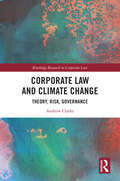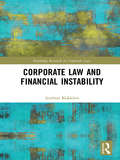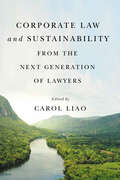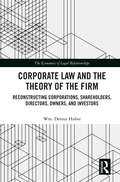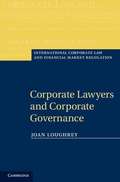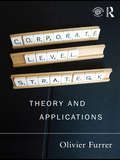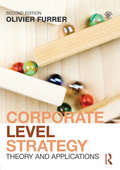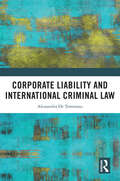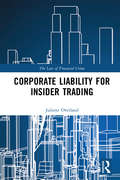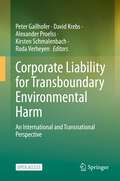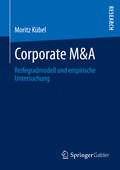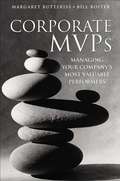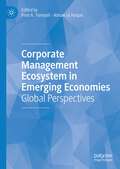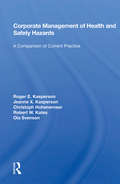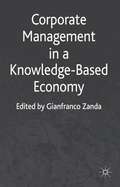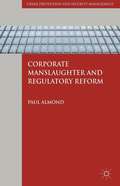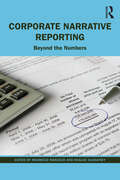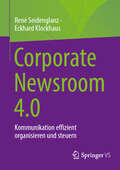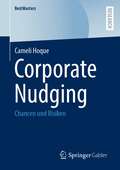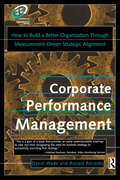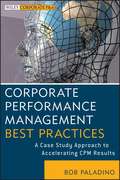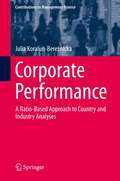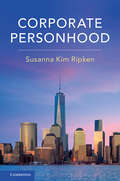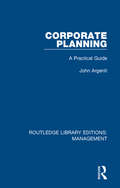- Table View
- List View
Corporate Law and Climate Change: Theory, Risk, Governance (Routledge Research in Corporate Law)
by Andrew ClarkeThis book provides an analysis of the impact of the climate crisis on corporate law and theory in the coming decades as the world seeks to meet the target of net zero carbon emissions by 2050.Net zero targets are a particular challenge for an economy such as Australia which has a historical reliance on fossil fuels, and powerful interests arguing for the continued use of coal and gas. The book examines four recent corporate case studies in Australia. The first two follow the Adani group of companies and coal in Queensland and Rio Tinto and the destruction of ancient rock shelters in the midst of iron ore mining in WA. The book then covers the pension fund member Mark McVeigh, issuing proceedings against REST super in relation to long-run investment decisions and the need to take into account climate risk. Finally, it discusses Sharma, a representative action taken by school children against the Federal government in relation to expansion plans in relation to fossil fuels allegingbreach of the duty of care. These case studies highlight some of the key trends and challenges in the intersection between corporate activity and the need to account for climate risk and adaptation, with Australia as a G20 economy having much to contribute to the global debate.The book will be of interest to students and researchers in the field of climate and environmental law, as well as corporate law and theory.
Corporate Law and Financial Instability (Routledge Research in Corporate Law)
by Andreas KokkinisVirtually all large banks and other financial institutions in the UK and internationally are public limited liability companies whose shares are listed on one or several stock exchanges. As such, their corporate governance and, in particular, the incentives faced by their directors and senior managers are to a significant extent determined by corporate and securities law rules such as directors’ duties, directors’ liability in insolvency, takeover regulation, disclosure obligations, shareholder rights and rules on executive remuneration. At the same time, systemically important financial institutions in the UK are licensed, regulated and supervised by the Prudential Regulation Authority (PRA). This book explores the relationship between, on the one hand, the broader corporate law, corporate governance and securities law framework and, on the other, the prudential regulatory framework. Although the book’s main focus is on UK law, much of the policy argumentation is relevant globally and therefore appropriate international comparisons are drawn, and analysis of EU law and regulation is included. The book argues that the corporate law regime, which focuses on shareholder empowerment and profit maximisation, operates as an antithesis to prudential regulatory objectives thus undermining the safety and soundness of banks and other financial institutions by encouraging risky behaviour that may be in the best interests of their shareholders, but is clearly not in the public interest.
Corporate Law and Sustainability from the Next Generation of Lawyers
by Carol LiaoMillennials have come of age in an era when environmental and social crises have defined much of their adult lives, as has the recurrent message that time is of the essence. Future generations will bear the greatest burden created by climate change, pandemics, and inequality, but often they are not in positions of power to make impactful decisions about it.This book gives voice to young lawyers offering new critical perspectives in the burgeoning field of corporate law and sustainability. Climate change is an intergenerational crisis, and the solutions and path forward must include intergenerational voices. Millennials are coming of age at a critical juncture in our climate and corporate history, and their perspectives stand apart from those who have been trained into myopic views of what constitutes change. These essays challenge the status quo across a number of pressing topics, including executive compensation, board diversity, decolonialization, crowdfunding, social media risk, corporate lobbying, shareholder activism, tax avoidance, global supply chain management, and human rights, written with a level of thoughtfulness and urgency that demands attention from policymakers and scholars alike.Edited by Carol Liao, a leading expert in the field, and with a foreword by author and filmmaker of The Corporation and The New Corporation Joel Bakan, this book offers timeless research from a diverse group of young lawyers calling for bona fide corporate accountability within legal and regulatory frameworks, including innovative ideas for reform.
Corporate Law and the Theory of the Firm: Reconstructing Corporations, Shareholders, Directors, Owners, and Investors (The Economics of Legal Relationships)
by Wm. Dennis HuberDozens of judicial opinions have held that shareholders own corporations, that directors are agents of shareholders, and even that directors are trustees of shareholders’ property. Yet, until now, it has never been proven. These doctrines rest on unsubstantiated assumptions. In this book the author performs a rigorous, systematic analysis of common law, contract law, property law, agency law, partnership law, trust law, and corporate statutory law using judicial rulings that prove shareholders do not own corporations, that there is no separation of ownership and control, directors are not agents of shareholders, and shareholders are not investors in corporations. Furthermore, the author proves the theory of the firm, which is founded on the separation of ownership and control and directors as agents of shareholders, promotes an agenda that wilfully ignores fundamental property law and agency law. However, since shareholders do not own the corporation, and directors are not agents of shareholders, the theory of the firm collapses. The book corrects decades of confusion and misguided research in corporate law and the economic theory of the firm and will allow readers to understand how property law, agency law, and economics contradict each other when applied to corporate law. It will appeal to researchers and upper-level and graduate students in economics, finance, accounting, law, and sociology, as well as attorneys and accountants.
Corporate Lawyers and Corporate Governance
by Joan LoughreyThis assessment of the corporate governance role of corporate lawyers in the UK analyses the extent to which lawyers can and should act as gatekeepers, counsellors and reputational intermediaries. Focusing on external and in-house lawyers' roles in both dispersed share-ownership and owner-managed companies, Joan Loughrey highlights the conflicts of interest that are endemic in corporate representation and examines how lawyers should respond when corporate agents provide instructions contrary to the company client's interests. She also considers the legitimacy of 'creative compliance', the ethical arguments for and against lawyers prioritising the public interest over their clients' interests, and their exposure to liability if they fail to perform a corporate governance role. Finally, she considers whether the reforms to the legal profession will promote the lawyer's corporate governance role and advances suggestions for reform.
Corporate Level Strategy: Theory and Applications
by Olivier FurrerThe challenges faced by diversified corporations – firms that operate in more than one industry or market – have changed over the years. There is now a wide range of strategies, including corporate level strategy, to add competitive advantage to these corporations as a whole. In Corporate Level Strategy, Furrer guides the reader in developing the ability to consider the impact of change and other important environmental forces on the opportunities for establishing and sustaining corporate advantage by exploring three fundamental questions: Why are some companies highly specialized, while others embrace a wide range of products, markets and activities? What is the link between scope and performance? What can we say about the management of multi-business firms in terms of structure, management systems and leadership? Replete with case studies and international examples, and featuring a companion website, this incisive book is an ideal read for advanced undergraduate and postgraduate students.
Corporate Level Strategy: Theory and Applications
by Olivier FurrerThe challenges faced by diversified corporations—firms that operate in more than one industry or market—have changed over the years. In this new edition, Olivier Furrer helps students of corporate strategy to consider the impact of critical changes in resources, businesses and headquarters roles on the firm’s ability for establishing and sustaining corporate advantage. New to this edition are stimulating pedagogical features and additional material such as a new chapter on the theoretical foundations of multibusiness firms, along with a host of new examples from across the world. A companion website supplements the book, providing PowerPoint slides, a test bank of questions, and lists of suggested case studies.
Corporate Liability and International Criminal Law
by Alessandra De TommasoThis book investigates whether corporate criminal liability should be incorporated within the scope of international criminal law. The work provides unique insight into the evolution of the debate on the international criminal liability of corporations to facilitate future discussion on the possibility of including corporations within the scope of international criminal law. It combines a detailed examination of Nuremberg and Rome with the examination of previously overlooked initiatives such as the Draft Code of Offences against Peace and Security of Mankind and the 1951 and 1953 Committees on International Criminal Jurisdiction. This analysis is also complemented by a review of significant post-1998 international and domestic developments around corporate criminal liability. In addition, it offers suggestions for the development of an amendment to hold corporations accountable under the Statute of the International Criminal Court. This book contributes to the existing literature on the topic of corporate liability which attracts significant attention from scholars in the fields of Law, Business, and Political Science. It will be useful to professionals in the academic and diplomatic fields, researchers, legal advisors, and business leaders. It will also be of interest to anyone who wants to understand the debate on holding businesses accountable under international criminal law.
Corporate Liability for Insider Trading (The Law of Financial Crime)
by Juliette OverlandCorporate Liability for Insider Trading examines the reasons why there have been no successful criminal prosecutions, or successful contested civil proceedings, against corporations for insider trading, and analyses the various rationales for prohibiting insider trading. It reviews the insider trading regulatory regime and describes its key features, using both national and international examples. The book inspects a variety of criminal and civil models of corporate liability and considers the historical and theoretical basis on which corporations are subject to insider trading laws. The specific elements of the insider trading offence and the manner in which they are attributed to corporations are analysed in detail. Defences available to corporations such as Chinese Walls are explored, and the obligations that are imposed on businesses as a result of insider trading regulation – security trading policies and notifications, continuous disclosure obligations, and duties concerning conflicts of interest – are detailed and examined. The book concludes with reform proposals intended to remedy the many legal and commercial difficulties identified, in order that a new regulatory regime might be adopted to better serve regulators, businesses, investors, and the broader market. This volume addresses these corporate law topics and will be of interest to researchers, academics, financial institution compliance officers, investment bankers, corporate and comparative lawyers, and students and scholars in the fields of commercial law, corporate law, financial crime, company law, and white collar crime
Corporate Liability for Transboundary Environmental Harm: An International and Transnational Perspective
by Kirsten Schmalenbach Peter Gailhofer David Krebs Alexander Proelss Roda VerheyenThis open access book aims to elaborate on the legal prerequisites to establish the liability of corporations for transboundary environmental harm, not only by identifying existing liability rules, principles and standards but also by analysing their potential for further legal development. The authors consider international and transboundary liability law to currently be an underutilised tool for international environmental protection. The book seeks to address this by exploring what is needed in terms of legislative action and identifying options for judicial pliability, thereby providing an important legal contribution in furthering the development of an effective international and transnational environmental liability law regime.
Corporate M&A: Reifegradmodell und empirische Untersuchung
by Moritz KübelParallel zur Entwicklung in der Praxis hat M&A seit den 1960er Jahren auch in der wirtschaftswissenschaftlichen Forschung zunehmend Beachtung erfahren. Wurden Unternehmensakquisitionen und deren wirtschaftliche Auswirkungen zunächst hauptsächlich aus finanzökonomischer Perspektive analysiert, so existieren inzwischen zahlreiche Untersuchungen aus unterschiedlichen Wissenschaftsdisziplinen und Forschungsperspektiven (z. B. Institutionenökonomik, Verhaltensökonomik, Lernforschung und Managementforschung). Insgesamt sind die Forschungsergebnisse zu M&A aber sehr fragmentiert, inkonsistent und lückenhaft. Es besteht nach wie vor großer Bedarf an weiterer empirischer Forschung, um die Erfolgsfaktoren von Unternehmenszusammenschlüssen besser zu identifizieren und relevante Praxisempfehlungen ableiten zu können. Die vorliegende Untersuchung ist fokussiert auf die Unternehmensebene als die relevante Betrachtungsebene und analysiert Charakteristika der akquirierenden Unternehmen. Forschungsziel ist ein theoriegeleiteter und empiriebasierter Beitrag zum wissenschaftlichen Verständnis von Serial Acquirern und zur Verbesserung ihres Leistungsvermögens in der Praxis.
Corporate MVPs
by Bill Roiter Margaret ButterissCorporate MVPs create extraordinary value for the organization by consistently exceeding expectations. MVPs produce tangible and dramatic business results; they improve the people they work with and the organization in which they work. In fact, the future of your business depends on this 5 to 10 percent of its very best people. But far too often, MVPs are lost because of management missteps, or even by no management at all. Based on in-depth interviews with senior executives and business owners, HR professionals and executive recruitment firms, and with MVPs themselves, Corporate MVPs explores what makes these talented individuals tick, how to develop and cultivate them, what it takes for someone to become an MVP, and the important role of HR in managing this key talent.
Corporate Management Ecosystem in Emerging Economies: Global Perspectives
by Fred A. Yamoah Adnan Ul HaqueEmerging economies, as actively changing societies, invoke questions about the future direction for national and global development as well as equitable economic growth. In this book, the Editors argue that understanding the corporate management ecosystem of emerging economies is key to business success in the globalized economy.Discussing the key attributes of emerging economies (for example, population dynamics, labour and production patterns, employment, and foreign direct investment) and the connection with governance, marketing, innovation management, and supply chain research and practice, the book highlights the distinctiveness of corporate management dynamics in comparison with existing knowledge that is dominated by developed country frameworks.The book offers twenty-one case studies that cover examples of corporate management research and practice in both local and international companies, making this a valuable resource for students, academics and industry stakeholders.
Corporate Management Of Health And Safety Hazards: A Comparison Of Current Practice
by Roger E. KaspersonThis book provides one of the first systematic accounts of how corporations manage risk to workers and consumers. Careful analysis and interviewing in different corporations elicit a portrait of the myriad hazards that currently confront industry, the corporate programs and resources that have emerged since 1970 to respond to this challenge, and factors that have contributed to successes and failures. In-depth studies of the Volvo Car Corporation, Rocky Flats nuclear weapons plant, Union Carbide's Bhopal facility, and large chemical and pharmaceutical corporations provide a state-of-the-art assessment of the advances and problems inherent today in industrial safety management. Roger E. Kasperson, Jeanne X. Kasperson, and Christoph Hohenemser are senior researchers at Clark University's Center for Technology, Environment, and Development (CENTED). Roger E. Kasperson is Director of CENTED and its Hazard Assessment Group. Jeanne X. Kasperson is Research Librarian at CENTED and Senior Research Associate in Brown University's World Hunger Program. Hohenemser, a professor of physics, directs the Environment, Technology, and Society Program at Clark University. Robert W. Kates, formerly with CENTED, is Director of the Alan Shawn Feinstein World Hunger Program at Brown University. Ola Svenson, of the Department of Psychology at Lund University in Sweden, is a leading researcher in the field of risk perception and decision analysis.
Corporate Management in a Knowledge-Based Economy
by Gianfranco ZandaCorporate Management in a Knowledge-Based Economy traces the evolution of corporate governance over time, with a particular focus on the changing nature of power. The control of scarce resources used in production materials, labour and capital has evolved considerably over the past centuries, with government, landowners, non-owner managers, and institutional investors acting as controlling powers at different points in time. In order to appropriately protect the various, and changing, stakeholders, the system of corporate governance has also developed over the years a process that continues to the present. In today's knowledge-based economy, with the rising importance of intangible assets, a new corporate management paradigm is needed. This book incorporates theoretical work as well as practical applications to analyse these developments and explore emerging trends of the 21st century. It examines how the pursuit of profit maximization has resulted in governance failures and it focuses on the prospective role of business ethics (once again in the spotlight following the credit crisis) in helping reform flawed governance structures. It argues that, in the long term, a system based on ethics can maximize social responsibility, customer satisfaction, human capital development and economic targets.
Corporate Manslaughter and Regulatory Reform
by Paul AlmondThis book provides an account of the international emergence of corporate manslaughter offences to criminalise deaths in the workplace during the last twenty years, identifying the limitations of health and safety regulation that have prompted this development.
Corporate Narrative Reporting: Beyond the Numbers
by Mahmoud Marzouk and Khaled HussaineyThis book presents a comprehensive and expert-led insight into the role, types, practises and determinants of corporate narrative reporting (CNR). It provides a detailed overview of the importance of narrative disclosure in understanding the full annual report and, consequently, company performance and future prospects. CNR comprises integral information presented in the front half of the annual report, which helps to tell the full story of a business, providing a comprehensive overview and understanding of both its past and future performance. Supported with illustrative tables and figures throughout, this volume contains a plethora of carefully selected chapters, featuring the analytical insight of knowledgeable academics and researchers from all over the world. Using different data collection and analysis methods, it links and advances theory and practice in the disclosure and presentation of non-financial information in annual reports and other disclosure channels. The book is logically structured into four parts: Narrative Reporting: The State of the Art Empirical Research on Narrative Reporting Narrative Sustainability Reporting Narrative Reporting in Times of Crisis Providing a global insight into CNR in practice, Corporate Narrative Reporting is an invaluable resource for both students and practitioners interested or involved in preparing, reviewing/auditing, analysing and understanding annual reports. It should also be of particular interest to policymakers, regulators and investors.
Corporate New Ventures at Procter & Gamble
by Teresa M. Amabile Dean WhitneyConsumer products giant Procter & Gamble is faced with an urgent need to revitalize new-product innovation, given its recent focus on incremental product improvements and its aggressive growth goals. As part of this effort, the company's top executives form a small, autonomous, cross-functional Corporate New Ventures team led by a young former brand manager. Operating within a conducive work environment, the team invents a systematic approach to gathering information and producing creative ideas for radically new product categories.
Corporate Newsroom 4.0: Kommunikation effizient organisieren und steuern
by René Seidenglanz Eckhard Klockhaus(Corporate) Newsrooms stellen im Kommunikationsmanagement ein Phänomen dar, welches sich immer weiter verbreitet und zunehmend in der Praxis durchsetzt. Demgegenüber steht eine – auch in unserer Forschung ermittelte – große Unsicherheit über Planung, Organisation und Umsetzung solcher Newsrooms.Vor diesem Hintergrund wird der Band gleichwohl relevante theoretische und wissenschaftliche Aspekte und Vorgehensmodelle einbeziehen, etwa aus der Betriebswirtschafts- resp. Managementlehre. Gleichermaßen bleibt sie dem kommunikationswissenschaftlichen Diskurs verbunden und beschreibt wirtschaftliche und organisatorische Faktoren. Es wird ganz konkret Nutzenmodelle vorstellen sowie Handlungsempfehlungen und Vorgehensweisen vorschlagen. Dieses Buch geht damit über den Status Quo der Marktbeobachtungen hinaus und bildet die Brücke zwischen Anforderungen und Machbarkeiten ab. Es leistet eine ganzheitliche Betrachtung von (Corporate) Newsrooms durch Einbettung in wissenschaftlicheDebatten und feldspezifische Herausforderungen und ermöglicht praktische Reflexion und konkrete Umsetzung von (Corporate) Newsrooms.
Corporate Nudging: Chancen und Risiken (BestMasters)
by Cameli HoqueDieses Buch widmet sich der Frage, wie private Unternehmen die Erkenntnisse der Verhaltensökonomie nutzen und Nudges erfolgreich in der Praxis einsetzen können. Die Untersuchung zeigt, dass Nudges sowohl im Mitarbeitermanagement als auch bei der Beeinflussung des Verbraucherverhaltens eine große Palette an vielversprechenden Anwendungsmöglichkeiten bieten. Die Arbeit betont jedoch auch potenzielle ethische Risiken und unerwünschte Auswirkungen und liefert umfangreiche Erkenntnisse über effektive Nudge-Techniken, ethische Überlegungen und Handlungsempfehlungen für Unternehmen.
Corporate Performance Management (Improving Human Performance Ser.)
by David Wade Ron RecardoBusiness experts, business economists, and organizational psychologists agree that a specific business strategy must be chosen for a corporation to excel. Beyond the strategy, companies must have a performance measurement system that ties every aspect of the organization - from the boardroom to the factory floor - to the strategy. In their book 'Corporate Performance Management', noted authors David Wade and Ron Recardo show companies how to craft a strategic focus and create sound business strategy by using a unique and pragmatic performance-measurement system. Concepts in the book are illustrated by 'real world' case studies. It provides tools and techniques to show how to apply the concepts within an organization.David Wade is the director of performance measurement for Aetna, Inc., and the author of several business-related books and articles.Ron Recardo is the founder and managing partner of The Catalyst Consulting Group, L.L.C. The author of several articles and books, he is a frequent speaker at meetings of professional associations, trade groups, and senior executives.
Corporate Performance Management Best Practices
by Bob PaladinoBusiness improvement best practices and a proven methodology for improving corporate performance management, illustrated through a high performing program including numerous team case studiesCorporate performance management consists of a set of processes that help organizations optimize their business performance. It provides a framework for organizing, automating and analyzing business methodologies, metrics, processes and systems that drive business performance. Corporate Performance Management Best Practices will help your organization benchmark itself against the best.Written by the winner of three globally accepted performance management awardsFocuses on a single case study chronicling a health care system's corporate performance management journeyExplores how the use of corporate performance management methods has created significant and broad based improvements in patient satisfaction scores, medical outcomes, people development, and corporate shared services and clinical processesRevealing practical techniques that can be adopted at all levels of an organization, from facilities manager to HR manager to CFO to CEO, Corporate Performance Management Best Practices provides a proven implementation model that accelerates breakthrough results.
Corporate Performance: A Ratio-Based Approach to Country and Industry Analyses (Contributions to Management Science)
by Julia Koralun-BereźnickaThis book presents the comparative evaluation of international and industrial factors affecting the financial condition of enterprises. In the theoretical part, the results of previous research on the occurrence of the country and industry effect in the financial health of companies are reviewed. The aim of the empirical study is to determine such factors - national or industrial ones - that have a greater impact on the corporate performance in the selected European Union countries. Corporate performance is measured and described with the use of a large set of fundamental ratios. Corporate performance is therefore treated as a more complex matter influenced by such aspects as profitability, liquidity, working capital and solvency. The book especially analyses the importance of non-public companies of all sizes, which is also rare as current research focuses mainly on public companies due to the data constraints.
Corporate Personhood
by Susanna Kim RipkenThe topic of corporate personhood has captured the attention of many who are concerned about the increasing presence, power, and influence of corporations in modern society. Recent Supreme Court cases like Citizens United, Hobby Lobby, and Masterpiece Cakeshop - which solidified the free speech and religious liberty rights of corporations and their owners - have heightened the controversy over treating corporations as persons under the law. What does it mean to say that the corporation is a person, and why does it matter? In Corporate Personhood, Susanna Kim Ripken addresses these questions and highlights the complexity of the corporate personhood concept. Using a broad, interdisciplinary framework - incorporating law, economics, philosophy, sociology, psychology, organizational theory, political science, and linguistics - this highly original work explores the complex, multidimensional nature of corporate personhood and its implications for corporate rights and duties.
Corporate Planning: A Practical Guide (Routledge Library Editions: Management #2)
by John ArgentiOriginally published in 1968. Corporate planning is now an established part of management thinking. John Argenti had a large part to play in introducing the technique to British management. His book shows how the manager can apply corporate planning in his own company with a very clear idea of why he is introducing it, what to expect from it, how to start, and what to avoid. This title will be of interest to students of business studies and management.
